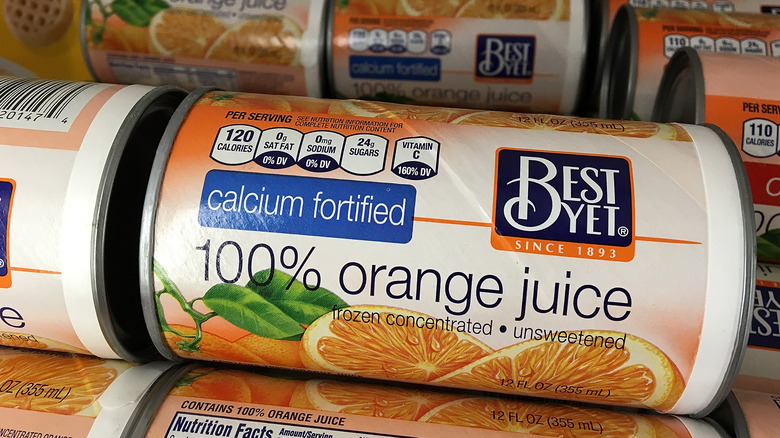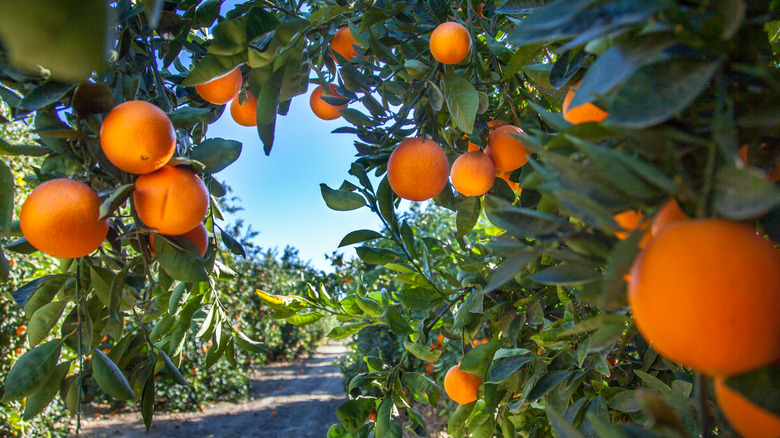The Reason Orange Juice Concentrate Fell Off The Face Of The Earth
There are probably multiple generations of Americans who have no idea what frozen orange juice concentrate is. However, it wasn't long ago that these cans were a staple of every American home's freezer. Made by removing the liquid from fresh orange juice, creating a concentrate that easily could be shipped all over the country, commercial demand of the product in the 1950s and 1960s helped an entire orange juice industry in Florida to flourish. Orange juice concentrate made the once-expensive beverage affordable, accessible, and much easier to prepare compared to squeezing oranges at home. But the concentrate's heyday has long passed.
The main reason is a lack of demand. American diet trends have fluctuated constantly over the last century. In the 1990s, there was a national shift in food culture to focus on words like "diet," low-fat," or "no fat" in a product's marketing. Tied to this change was an increased usage of terms like "organic" and "all-natural," which have become pervasive in today's America. All of a sudden, the words "from concentrate" became taboo. Companies pounced on this and started selling orange juice in bottles and cartons labeled "not from concentrate," made possible thanks to developments in orange juice production and pasteurization.
Once the convenience of liquid OJ in the fridge took hold, it was game over for frozen concentrate. But in a surprising twist, fresh orange juice is now experiencing a decline of its own.
Fresh orange juice's health benefits are now under scrutiny
Alongside the ever-changing landscape of American dietary trends, the perceived value of orange juice as a whole has also shifted. Orange juice had once cemented itself as part of a balanced breakfast for decades due to its high levels of Vitamin C, potassium, folates, and antioxidants. However, many experts today are warning about the high amount of sugar the drink contains: 8 ounces of OJ has 22 grams of sugar in it. Consuming this amount of sugar every morning can cause weight gain and higher blood sugar levels, according to Healthline.
In place of orange juice, smoothies and cold-pressed juices are now hailed as the healthiest breakfast beverages. In 2021, the market for cold-pressed juices in the United States was worth approximately $1.45 billion, with all signs pointing towards a continued increase in the next ten years. Meanwhile, from 2000-2020, orange juice sales have consistently declined year after year.
Plant disease has also contributed to orange juice's decline
As if things weren't bad enough for orange juice, America's orange crop has been devastated by a deadly disease for nearly 20 years. Citrus greening, also known as yellow dragon disease, made its first appearance in Florida in 2005, and is spread by an insect known as the Asian citrus psyllid. The disease affects approximately 18 kinds of citrus plants, including orange, grapefruit, lemon, lime, and kumquat, just to name a few. It corrupts the fruit, producing green, bitter oranges that are inedible. Once a tree is infected, it cannot be cured and usually dies within a few years.
Since its arrival in America, citrus greening has become responsible for a 75% decrease in orange juice production in Florida alone, and it has gone on to affect crops as far away as California. The result is less orange-related products on store shelves, at a higher cost. With dwindling supplies and the focus still mostly on bottled OJ these days, frozen orange juice concentrate might go the way of the dodo bird.



